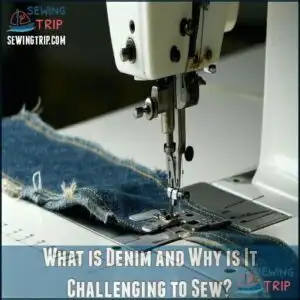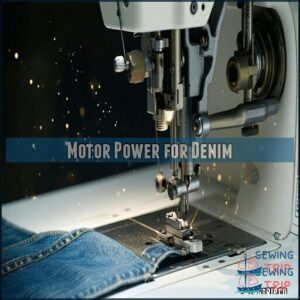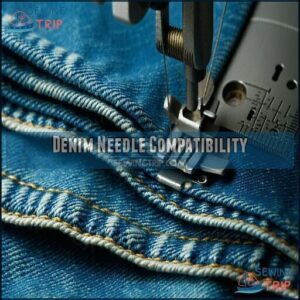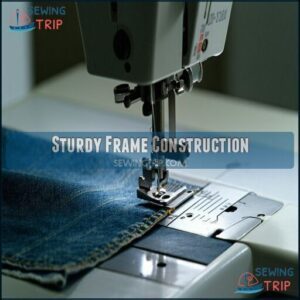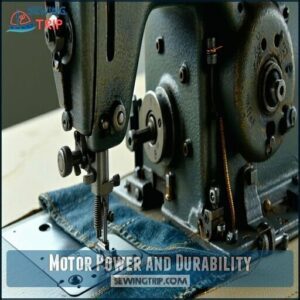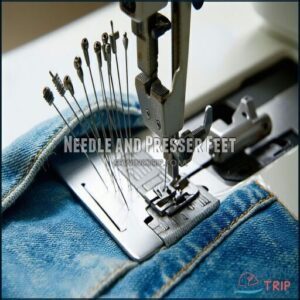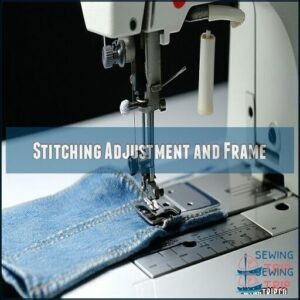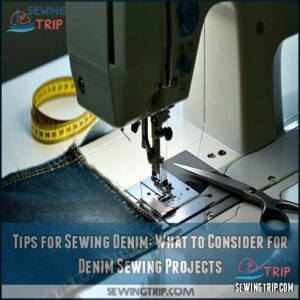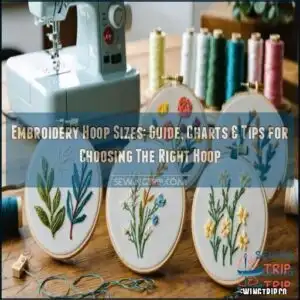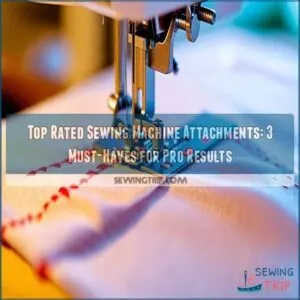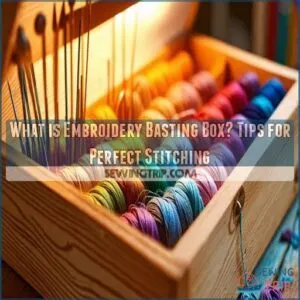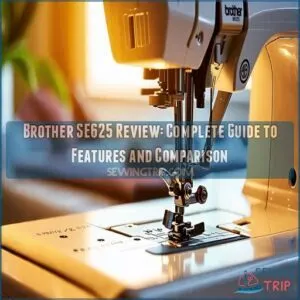This site is supported by our readers. We may earn a commission, at no cost to you, if you purchase through links.
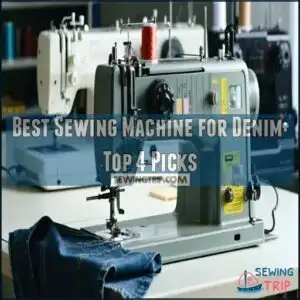 If you’re tackling thick denim, a heavy-duty sewing machine is your best bet.
If you’re tackling thick denim, a heavy-duty sewing machine is your best bet.
The SINGER Heavy Duty 4452 leads the pack with its powerful motor, 1,100 stitches per minute, and stainless steel bedplate for smooth fabric flow. The Juki TL-2010Q offers industrial-grade features like a sturdy frame and precise speed control.
The Brother CS6000i shines if you want computerized options without breaking the bank, while the Janome HD3000 combines durability with user-friendly design.
Look for machines with adjustable presser feet, denim-compatible needles, and consistent stitching power. Ready to conquer denim? There’s so much more to explore about stitching success!
Table Of Contents
- Key Takeaways
- Top 4 Best Sewing Machines for Denim
- What is Denim and Why is It Challenging to Sew?
- Key Features to Consider in a Sewing Machine for Denim
- Buying Guide: How to Choose The Best Sewing Machine for Denim
- Tips for Sewing Denim: What to Consider for Denim Sewing Projects
- Frequently Asked Questions (FAQs)
- Conclusion
Key Takeaways
- Look for a machine with a strong motor, sturdy frame, and durable construction to tackle thick denim layers without skipping stitches.
- Choose a model with features like adjustable presser feet, denim-compatible needles, and precise stitch control for smooth, consistent results.
- Heavy-duty options like the SINGER Heavy Duty 4452 or Janome HD3000 excel at handling denim with their reliable performance and power.
- For beginners, user-friendly machines like the Brother CS6000i combine versatility and ease of use while still managing denim projects effectively.
Top 4 Best Sewing Machines for Denim
You’re looking for the best sewing machine to handle denim, and you’ve come to the right place.
The best sewing machines for denim combine power, precision, and durability to conquer thick fabrics with ease and style.
Our top 4 picks, including the SINGER Heavy Duty and Janome HD3000, offer the power and features you need to sew denim with ease.
1. SINGER Heavy Duty Sewing Machine
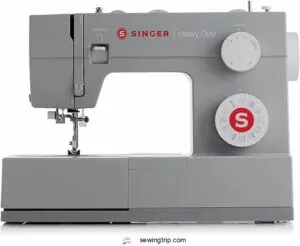
You’re looking for a reliable sewing machine, and the SINGER Heavy Duty Sewing Machine is a great option.
With its metal interior frame and stainless steel bedplate, it’s built to last.
It offers 110 stitch applications, adjustable stitch width, and a powerful motor, making it perfect for denim sewing projects.
Its extra-high sewing speed and durability guarantee efficient results, making it a great choice for both beginners and experienced sewists, providing stability and control.
Best For: heavy-duty projects, garment design, upcycling, and home decor, making it ideal for both beginners and experienced sewers.
- Extra-high sewing speed up to 1,100 stitches per minute for efficient results
- Durable metal frame and stainless steel bed plate for stability and smooth fabric feeding
- 110 stitch applications for creativity and customization, including basic, stretch, and decorative stitches
- May be too heavy for some users at 14.6 lbs, limiting portability
- Limited to 110 stitch applications, which may not be enough for advanced sewers
- No explicit mention of a warranty or dedicated customer support, which may be a concern for some buyers
2. Juki Portable Sewing Machine
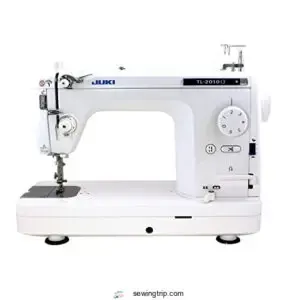
You’ll love the Juki Portable Sewing Machine for its precision and durability.
Made of sturdy aluminum, it offers a 23-inch work area, perfect for quilting.
Features include an automatic thread trimmer, knee lifter lever, and automatic needle threader.
This machine provides unparalleled convenience and consistent stitching.
With its industrial-quality construction and user-friendly features, it’s ideal for sewing denim and other heavy fabrics, giving you control and mastery over your projects.
Its performance and durability make it a great choice for sewers of all levels.
Best For: users focused on straight-stitch sewing and speed, particularly those working with heavy fabrics like denim and upholstery materials.
- The threading process can be complex and requires practice to manage
- The machine is not suitable for zigzag or decorative stitches, requiring a secondary machine for those functions
- The user manual is poorly designed, making it necessary to rely on external resources like YouTube tutorials for troubleshooting and guidance
- The Juki Portable Sewing Machine offers precision and durability with its industrial-quality construction
- It provides unparalleled convenience with features like an automatic thread trimmer and knee lifter lever
- The machine is suitable for sewers of all levels, giving users control and mastery over their projects
3. Brother CS6000i Sewing Machine
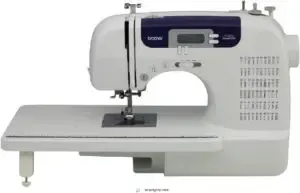
With the Brother CS6000i, you’ll discover a versatile sewing machine designed for novices and enthusiasts.
It features 60 built-in stitches, including decorative options and 7 auto-size buttonholes.
The automatic needle threader and jam-resistant bobbin simplify threading, and you’ll appreciate the included accessories, like a hard case and wide table, and the 25-year limited warranty.
This machine offers a wide range of creative possibilities, making it an ideal choice for those looking to expand their sewing skills and take control of their projects with ease and precision, and it’s a great option for denim sewing, providing users with ease and precision.
Best For: beginners and intermediate users looking for a versatile and easy-to-use sewing machine to expand their sewing skills and take control of their projects with ease and precision.
- The Brother CS6000i features 60 built-in stitches, including decorative options and 7 auto-size buttonholes, offering a wide range of creative possibilities.
- The machine comes with a variety of accessories, including a hard case, wide table, and 10 sewing feet, making it a great value for the price.
- The automatic needle threader and jam-resistant bobbin simplify threading, while the 25-year limited warranty provides peace of mind for users.
- The machine may not handle thick fabrics well without adjustments, and tension issues can occur if not properly set.
- Some users have reported persistent errors, such as the E6 error, which may require professional repair.
- The machine is not recommended for heavy or frequent use, making it less suitable for professional sewers or those with high-volume sewing needs.
4. Janome HD3000 Sewing Machine
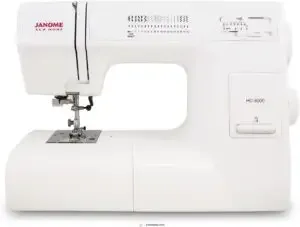
With the Janome HD3000, you’re getting a reliable sewing machine that’s built to last.
It features 18 built-in stitches and a one-step buttonhole, making it versatile for various projects.
The metal body provides durability, while the built-in needle threader and snap-on presser feet simplify the sewing process.
You’ll appreciate the extra-high presser foot lift and push-pull bobbin winder, giving you precise control over your stitches.
This mechanical sewing machine is great for those who prefer a straightforward tool, delivering consistent performance, making it a great primary or backup machine.
You’ll find it suitable for sewing denim and other heavy fabrics, and its robust design contributes to long-lasting performance, making it a worthwhile investment.
Best For: beginners or experienced sewists looking for a reliable and versatile sewing machine for general home use or as a backup machine.
- The machine may struggle with sewing through very thick or heavy materials like heavy leather or sailboat sails.
- It lacks some features like an automatic thread cutter or knee lift, which are available in higher-end machines.
- The stitch selector display lacks a light, making it hard to read in low light conditions.
- The Janome HD3000 has a durable metal body and 18 built-in stitches, including a one-step buttonhole, making it suitable for various projects.
- It features a built-in needle threader and snap-on presser feet, simplifying the sewing process and providing precise control over stitches.
- The machine is great for sewing denim and other heavy fabrics, and its robust design contributes to long-lasting performance.
What is Denim and Why is It Challenging to Sew?
Sewing denim can be tough.
Denim’s composition and weave structure make it thick and prone to tearing.
Its dense fabric demands powerful machines to penetrate seamlessly, risking damage without the right equipment.
Mastering denim sewing requires understanding its unique challenges, like fabric thickness and tearing risks, to choose the right machine for sewing jeans and other denim fabric projects.
Key Features to Consider in a Sewing Machine for Denim
You’re looking for a sewing machine that can handle denim, and you know it requires specific features to get the job done.
When choosing a machine, you’ll want to evaluate key features like motor power, denim needle compatibility, and sturdy frame construction to guarantee you can sew through thick denim with ease, considering factors such as sturdy frame construction.
Motor Power for Denim
You’ll need a denim sewing machine with sufficient motor power for piercing thick fabrics.
Motor strength and torque are essential for heavy duty sewing, ensuring speed control and longevity.
A powerful motor provides the necessary piercing power for sewing jeans and other thick fabrics with ease and precision always.
Denim Needle Compatibility
You’ll want a denim sewing machine with compatible needles, considering needle size, point types, and fabric thickness to avoid breakage, ensuring smooth denim sewing.
With various brand variations available for your sewing machine for jeans, including a suitable denim needle, you can find the right tools for your project.
Consider purchasing specialized needles for denim to improve stitch quality, and make sure to choose the correct type for your specific needs, such as denim sewing.
Sturdy Frame Construction
You’ll benefit from a denim sewing machine with a sturdy metal frame, reducing vibration and ensuring longevity.
This construction benefit is essential for heavy duty sewing, providing a durable sewing machine for jeans that can handle thick fabrics with ease, making it a great investment.
Some models also include a semi-automatic needle threader to simplify the threading process.
Buying Guide: How to Choose The Best Sewing Machine for Denim
You’re looking for a sewing machine that can handle denim with ease, and you want to know what factors to evaluate when making your purchase.
You’ll need to think about motor power, needle and presser feet compatibility, and stitching adjustment to find the best sewing machine for your denim projects, considering complete concepts.
Motor Power and Durability
When choosing a denim sewing machine, consider motor strength and frame materials for durability.
Key factors include:
- Motor power
- Frame materials
- Vibration control
- Longevity expectation
- Maintenance needs, ensuring a durable sewing machine for heavy duty sewing.
Many users find replacement sewing machine motors improve performance.
Needle and Presser Feet
When selecting a denim sewing machine, consider Needle Types, like denim needles, and presser foot options, including Walking Foot and Specialty Feet, to handle thick denim fabric with ease.
Using the right needle is important, so consider denim needle sizes for the fabric weight, ensuring proper Foot Pressure and feed dog control for smooth sewing.
This will help in ensuring that the denim fabric is sewn with ease, and the right needle is used for the fabric weight.
Stitching Adjustment and Frame
When buying the best sewing machine for denim, consider stitch length and frame materials.
Key features include:
- Stitch Length
- Frame Materials
- Vibration Dampening
- Durability Testing, for a sturdy frame and smooth denim sewing experience.
Tips for Sewing Denim: What to Consider for Denim Sewing Projects
You’re about to start sewing denim, and a few key factors are vital to guarantee your projects turn out well.
When sewing denim, you’ll want to think about needle selection, machine power, and topstitching techniques to achieve professional-looking results.
Needle Selection for Denim
When sewing denim, you’ll need to take into account Needle Types, such as denim or universal needles, and Needle Sizes, ranging from 70/10 to 110/18.
You can find various needle options online.
| Needle Sizes | Fabric Weight |
|---|---|
| 90/14 | Lightweight |
| 100/16 | Heavyweight |
| 110/18 | Extra Heavy |
| 70/10 | Very Lightweight |
Importance of Machine Power
You need a sewing machine with strong motor strength to handle thick denim layers.
Heavy-duty sewing machines offer better needle penetration and speed control, making them the best sewing machine for denim projects.
Ensuring a smooth denim sewing experience with ideal needle force is crucial, and heavy-duty machines provide this with their better capabilities.
Tips for Topstitching Denim
When topstitching denim, you’ll master the technique by adjusting stitch length, using the right presser foot, and selecting suitable thread and needle type, ensuring your sewing machine is set up for ideal denim sewing with proper tension adjustment for a professional finish on your denim fabric projects.
For superior results, consider using a jeans presser foot to navigate bulky seams.
Frequently Asked Questions (FAQs)
Which sewing machine is best for working with denim?
The Singer 4452 Heavy Duty is your denim champion.
With a powerful motor, 1,100 stitches per minute, and a stainless-steel bedplate, it handles thick seams like a pro.
Ensuring smooth, precise stitching every time.
Can a sewing machine work with denim?
Sure, machines can handle denim, but only if they’re tough enough.
A heavy-duty model with a strong motor, denim needles, adjustable presser foot, and sturdy frame guarantees you’ll conquer thick, stubborn fabric like a pro.
What is the best beginner sewing machine for jeans?
You’ll love the Brother ST371HD for sewing jeans.
It’s beginner-friendly, with 37 stitches, a durable metal frame, an automatic needle threader, and a jam-resistant bobbin.
It handles thick denim layers like a pro!
What are the best stitches for a denim sewing machine?
Imagine stitching denim perfectly on your first try—use a straight stitch for seams, zigzag for fray prevention, and a topstitch for aesthetics.
Longer stitch length (3-4mm) guarantees durability without thread snapping.
How do you sew denim?
Start with a denim needle and sturdy thread.
Use longer stitches to prevent breaking, and adjust presser foot pressure for smooth fabric feeding.
Sew slowly over thick seams, using a hammer to flatten if needed.
What is the best sewing machine for pants?
A workhorse sewing machine, like the Singer 4423 Heavy Duty, handles pants effortlessly.
Its strong motor, adjustable presser foot pressure, and 1,100 stitches per minute guarantee smooth seams on jeans, slacks, or casual trousers, making it ideal for working with thick fabrics like those used in jeans.
What is the best thread type for denim?
For sewing denim, go with strong polyester thread or a cotton-wrapped polyester blend.
It’s tough enough to handle thick fabric and resists snapping, letting your seams hold up under stress and wear.
How do I prevent skipped stitches on denim?
Match your needle to the task; use a denim-specific needle for thick layers.
Adjust stitch length to 3-4mm, increase presser foot pressure, and make certain your thread matches the fabric’s weight to avoid skipped stitches.
Are computerized machines better for sewing denim?
Computerized machines can be great for denim because they offer precise stitch control, adjustable settings, and automated features like needle threading.
However, they must have a strong motor, metal frame, and heavy-duty capabilities to handle thick fabrics.
Which presser foot is ideal for denim hems?
Tackling denim hems is like traversing thick terrain—use a walking foot or jeans presser foot.
They prevent slipping, ensuring even stitches across layers.
Trust me, it’s your ticket to smooth, frustration-free sewing.
Conclusion
Finding the best sewing machine for denim isn’t just about power—it’s about precision, durability, and adaptability.
Whether you’re drawn to the SINGER’s speed, Juki’s industrial finesse, Brother’s tech-savvy features, or Janome’s reliability, choose a machine that meets your needs.
Look for features like strong motors, denim-compatible needles, and sturdy builds.
Remember, sewing denim challenges both skill and equipment, but with the right machine, every stitch can be smooth, consistent, and crafted to perfection.
- https://www.longancraft.com/blogs/sewing-tips/best-sewing-machine-to-sew-denim-5-reliable-options
- https://www.favoritethings.net/sewing/our-ratings/sewing-machines-for-denim/
- https://www.ebay.com/b/Denim-Industrial-Craft-Sewing-Machines/3118/bn_72681170
- https://www.nytimes.com/wirecutter/reviews/best-sewing-machine/
- https://www.reddit.com/r/sewhelp/comments/y7tqwv/all_in_one_sewing_machine_that_can_handle_denim/

